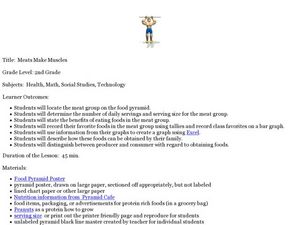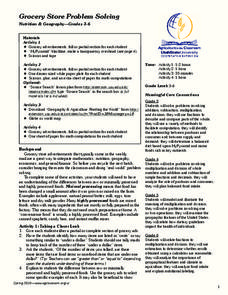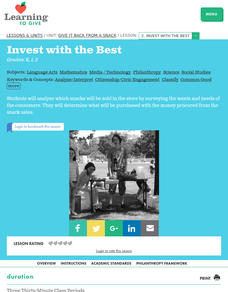Curated OER
Transforming Food Energy: A Balancing Act
Students explain their role as consumers. They use a purchased calorimeter or make their own simple calorimeter to measure the energy content in selected foods. This interesting instructional activity really gets students thinking about...
Curated OER
Comparison Food Shopping: Buying Groceries for Two People for One Week
Twelfth graders investigate how to develop a simple food budget for two using newpaper ads, the basic four food groups, and calorie counts.
Curated OER
Healthy Snacks. Healthy Packaging
Fourth graders research how to select the most cost-effective snacks. In this consumer practices lesson, 4th graders compare packaging labels and come to conclusions on how cost effective the product is. Students discuss their findings.
Curated OER
Kumara Math
Students explore nutrition by completing math problems in class. In this food conversions lesson, students identify what the kumara plant is and how it can contribute to human health by regularly consuming an appropriate amount. Students...
Curated OER
What Did It Cost 100 Years Ago?
Students compare prices of good across the century in order to introduce the topic of inflation. They undertand the concepts of inflation and Consumer Price Index (CPI), use online calculators to figure the approximate cost of goods...
Illustrative Mathematics
Bake Sale
Put math into action with the real-life scenario of a bake sale. The participants at this bake sale are ready to divide their fresh-baked cookies into bags. It is up to your number crunchers to help decide how many cookies should go in...
Curated OER
The Chain Gang
Students perform a food chain simulation to determine what happens when a food chain is broken.
Baylor College
We Need Water
There's nothing quite like a glass of ice-cold, freshly squeezed lemonade. Lesson seven of this series explains how the water humans need to survive can come in many forms. Teach your class about how much water humans require every day...
Baylor College
Your Energy Needs (BMR)
How many Calories one needs on a daily basis is dependent on a number of factors including gender, height, and activity level. In the third of seven lessons about energy and food, young nutritionists calculate the number of Calories...
Curated OER
Meats Make Muscles
Second graders explore the meat group of the food pyramid. In this nutrition and diet lesson, 2nd graders study the benefits of eating foods in the meat group, collect data regarding their classmates' favorite foods, and create a graph...
Curated OER
And You Thought Gasoline Was Expensive!
Students carry out a cost analysis. In this comparative math lesson, students compare the cost of equal measures of gasoline to mouthwash, house paint, fruit juice, white-out, and other liquids.
Curated OER
Rising Gas Prices – Compounding and Inflation
Financial literacy skills and exponential models are connected by the compound interest formula in this task centered on inflation calculations. Collaborative learners get experience collecting data from the given websites and exploring...
Curated OER
Grocery Store Problem Solving
Students use multiple math skills to complete grocery story problems. In this grocery math instructional activity, students study grocery ads to learn about the cost of foods. Students investigate food types and the costs of processed...
Curated OER
Everything's Connected
Students explore how trash decomposes. In this ecosystem lesson, students discuss new vocabulary words, such as producers and consumers, and think critically to answer how landfills work.
Curated OER
Money Management-Grocery Shopping for a Family Profile
Students investigate a family profile and design a menu plan. In this consumer science lesson, students plan and prepare a weekly menu based on a family profile.
Curated OER
Give It Back From a Snack Lesson 2: Invest With the Best
Students survey schoolmate as to what type of snacks they would prefer to purchase. They graph the results and apply them to planning a classroom snack sale while examining what wants, needs, and consumers are.
Curated OER
Give it Back from a Snack
Learners conduct and analyze a survey about snacks. In this graphing lesson, students ascertain which snacks would be the best choice for the community. Learners hold a sale and decide how the money could best be spent for the school...
Beyond Benign
Ecological Footprint
How does your lifestyle measure up in terms of your ecological footprint? Young ecologists examine their impact on the planet using an insightful online calculator. A short quiz asks users to rank the size of their homes, their energy...
Curated OER
Giving'Em The Business
Students work in groups of 4-5 to form a business, create, market & sell their product, and track their expenses and profits. They experience the roles of producer, distributor, and consumer of goods. They collect, organize and...
Curated OER
Shop 'Til You Drop
Students compare food prices to find the lowest unit price and make choices about where to shop and what to purchase on weekly items, cost comparisons and items needed. They collect grocery ads and weekly sale flyer's to expedite their...
Curated OER
Applied Maximum Minimum Problems
Students investigate the maximum and minimum of a graph as it related to cat food. In this calculus lesson, students analyze the amount of cat food a cat consumes, identifying the maximum and minimum amount. They graph their data and...
Curated OER
Oklahoma's Berry Best
Ask your learners to complete activities related to Oklahoma's agriculture, berries in particular. The instructional activity is cross-curricular and has class members investigate an article about berries, write an acrostic poem, and...
Curated OER
What proportion of rough rice is prepared into consumable rice?
Fifth graders find the percentages of rough rice that can be eaten. For this percentage lesson, 5th graders look at 100 lbs. of rough rice and see the steps needed before it can become the white rice sold in stores. They find the...
Curated OER
Equivalents Bingo-Enrichment Activity
Sometimes you need to play a game in order to reinforce learning. Use Bingo cards to review the equivalents for both dry and liquid portions. Playing Bingo helps learners to practice recognizing measurement units, abbreviations, and...

























